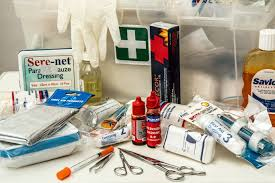Keeping Pets Safe on Your Vacation

Vacation season is coming up quickly! The urge to pack up and leave all the stresses of life behind becomes a driving force as the seasons change and the dog days of summer approach. You are planning, packing, and checking your list twice, but then Fido or Fluffy jumps on your suitcase. How can you leave them behind? Whether you surf the waves along the pacific coast, hike the Rockies, road trip along historic route 66, or travel abroad, you would like to have your furry loved one by your side. There are special measures you need to take as a pet-parent to keep your pet safe, happy, and their tails wagging during the entire trip.
Here are some tips and tricks to keep your travel companion safe.
 1. Have all vaccinations, paperwork, and identification tags up to date.
1. Have all vaccinations, paperwork, and identification tags up to date.
You should have your pet’s vaccinations up to date, paperwork for the vaccinations, and id tags with current contact information with you. Having the proper shots and documentation is helpful to protect your pet from disease as well as other pets and people. Bites can happen, pets can get loose and lost, and public places and hotels may inquire about current vaccinations. It is always better to be up to date and prepared than scrambling to have forms sent to you or having someone call an inaccurate contact number on your found pet’s id tag.
2. Research animal limitations and requirements if traveling abroad.
Researching prior to taking your pet to another country is a must. There are regulations, rules for taking pets out of the country and bringing them back in, quarantine procedures, and much, much more for us pet parents to be aware of. Not being aware or following the procedures could lead to consequences for you and your pet that could mean splitting up or not being able to come home. Check out the U.S. Department of States website for further reading on proper procedures.
3. Keep snacks, food, and water available always.
Pets get hungry and thirsty on the long journey to your destination too! Keep in mind that rest stops while traveling and sightseeing are crucial to keeping you and your furry companion hydrated and fed. A container full of food, water bottles, and collapsible food and water bowls are helpful when traveling to and enjoying your time at your destination. A cooler stocked full of water is a great idea for a day at the beach, extra snacks for hiking, and your pet’s favorite food for every stop in between are all essentials for a trip well spent.
 4. Follow all rules (on leash and off leash).
4. Follow all rules (on leash and off leash).
Not following the rules is a party foul. Make sure that you take note of the signage. If the beach or trail says no dogs allowed, you are better off finding somewhere else to spend the day. Being courteous to other vacationers is in your best interest. Signs may prohibit or limit the activities you and your pet can participate in, but it is worth following the rules.
5. Never leave your pet unattended or in a car or for long periods of time alone in a hotel.
This is a bit of common sense, but leaving your pet in a car unattended for a long period of time is a no go. Your pet should get out and stretch at rest stops with you. If you have to run in for supplies, make it quick. If you are leaving your pet at a rental home or hotel for a while, realize that they may be stressed being in a new place. Separation anxiety and not being familiar with new surroundings can be scary for pets. Make them comfortable by taking along their bed, a toy or two, and letting them get adjusted to their temporary home can all help make your pet more comfortable on vacation.
6. Research pet friendly accommodations.
This is a big one! Make sure that wherever you choose to stay allows pets. Some hotels may have restrictions on size, number, and types of pets they allow to stay. Rental homes also usually have a pet fee. Have paperwork for shots on hand!
 7. Always be aware of the weather conditions and pack accordingly.
7. Always be aware of the weather conditions and pack accordingly.
Are you going somewhere cold or exceptionally hot for vacation? Your pet may need special accommodations to help keep them comfortable and safe in the new climate. From sweaters and booties, to fans and sunscreen, you should remember to pack for your pet too. It is also useful to pack dog poop bags, wipes, and any other special amenities your pet may need.
8. Emergency kits.
Always have a first aid kit. Being able to administer simple first aid to humans and pets can be a lifesaving skill. Keep a first aid kit in your car and take it with you on your adventures. Bandages, emergency heat blankets, you and your pet’s medications, antiseptics that are pet friendly, a flashlight, batteries, and an emergency food store (I suggest a pet friendly jar of peanut butter that does not contain xylitol) are just a starters list for a helpful emergency kit.
